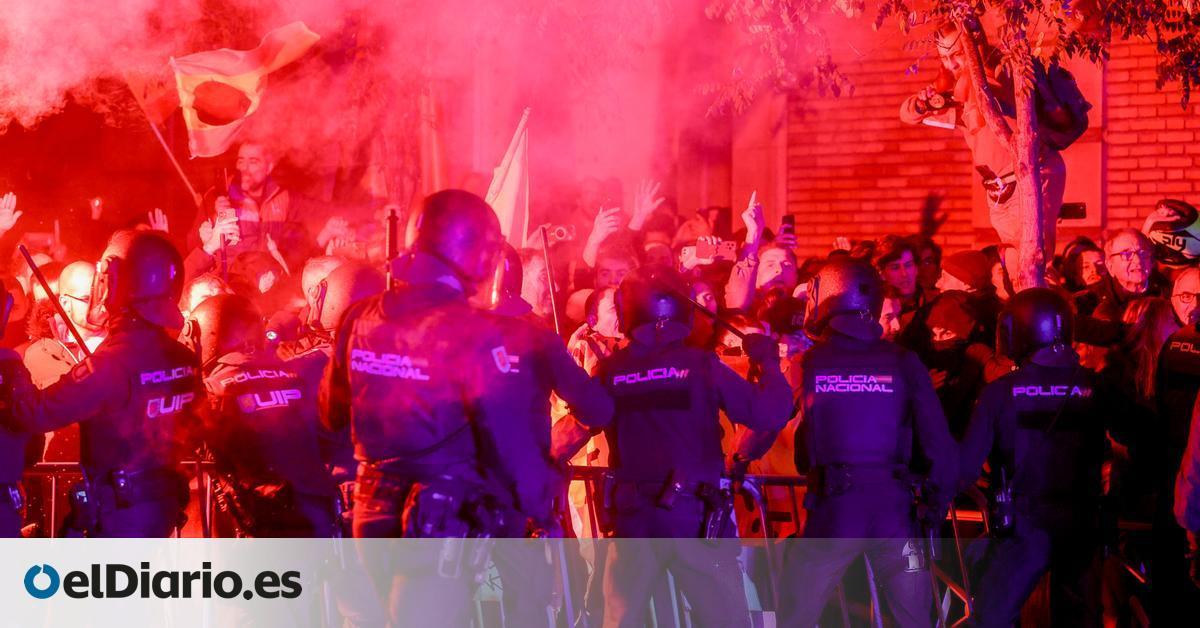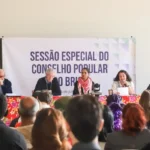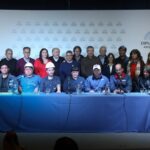
The negotiations between the PSOE and Junts for the investiture of Pedro Sánchez are facing decisive days. Whether for an agreement or to go to new elections, the calendar is immovable and moves inexorably towards the deadline of November 27. Until then, the right has reacted in only one way: encouraging mobilizations against an amnesty whose exact content no one knows except the negotiators. The PP and Vox, who compete to lead these protests, try to keep the noise in the streets from decreasing with a cascade of calls throughout the month, with the extreme right expressly supporting the violent concentrations in front of the PSOE headquarters, and the PP minimizing the incidents, when he does not directly blame the Government.
After the second night of altercations in front of the PSOE headquarters on Ferraz Street in Madrid, Feijóo broke his silence about the riots. In a tweet published after eleven o’clock on Tuesday night, the leader of the PP assured that “social unrest is the responsibility” of the acting president of the Government and socialist leader, Pedro Sánchez. Feijóo criticizes the riots, and asks for the “respect and exemplarity that the PSOE and its partners always lacked.” “We are not like them. Not like the minority that acts the same,” he concludes, without expressly condemning the facts.
Social unrest is the responsibility of @sanchezcastejonbut the protests must start from the respect and exemplarity that was always lacking in @PSOE and his partners.
We are not like them. Not like the minority that acts the same.
See you on Sunday the 12th at 12 in the squares throughout Spain.
— Alberto Núñez Feijóo (@NunezFeijoo) November 7, 2023
The tweet was published several hours after the altercations caused by ultra protesters. Previously, Sánchez himself had criticized a “silence” that “portrays” the PP, a party that he does not cite.
We do not expect anything from those who, by action or omission, support the siege of socialist people’s homes. Their silence portrays them.
Social advancement and coexistence are worth it.
They will not break @PSOE.
— Pedro Sánchez (@sanchezcastejon) November 7, 2023
In his message, Feijóo takes the opportunity to reiterate the call to demonstrate next Sunday against the amnesty. The PP wants to fill all of Spain with rallies against the negotiation between the PSOE and Junts. After those in Galicia, Madrid, Malaga and Valencia, the leader announced this Monday protests in each provincial capital. 52 simultaneous mobilizations, something that the barons of the party view favorably to allow each territory to show its rejection of the negotiation with the independentists without having to travel, as usually happens.
The only popular leader who did unreservedly condemn the riots in front of the socialist headquarters was her parliamentary spokesperson, Cuca Gamara, who after midnight assured that “nothing justifies the violence that has been experienced today by a minority.” “My resounding condemnation,” she added on X, the old Twitter.
Given the social unrest due to the transfers that Sánchez plans, opposition to the amnesty can only be done through peaceful and democratic means. And so we will do it on Sunday the 12th at 12.
Nothing justifies the violence that has been experienced today by a minority. My resounding condemnation.
— Cuca Gamarra (@cucagamarra) November 7, 2023
Gamarra, Feijóo and the entire PP will support the Madrid rally, which will be held in Puerta del Sol. The general secretary of the regional PP, Alfonso Serrano, sent a message on Tuesday to all public officials – which includes councilors and deputies , but also to advisors – imposing “mandatory” attendance at the Sunday mobilization, reports Fatima Caballero.
“You must reach numbers like Goya’s,” the writing states, in reference to the mobilization of last September 24 in the Plaza de Felipe II, and in which the PP brought together tens of thousands of people. “The maximum mobilization of the party is necessary in the face of a moment like this,” insists the number two by Isabel Díaz Ayuso.
The PP of Madrid has positioned itself, as usual, as far to the right as it can in its party. It was precisely Esperanza Aguirre, a reference for the current president of Madrid, who last weekend encouraged those who gathered in front of the PSOE headquarters in the capital to cut off traffic on Ferraz Street.
These concentrations have been adding participants until Monday afternoon when the leader of Vox, Santiago Abascal, joined, who left the concentration when clashes began between protesters and the riot police deployed to protect the socialist headquarters.
A few hours later, Vox once again called for new mobilizations in front of Ferraz’s headquarters for Tuesday afternoon.
The PP statement released early in the morning accused the Government of “forcing” the Police to “treat as CDR” and “unfairly” the violent people in Ferraz on Monday night.
Neither Feijóo nor Gamarra nor Borja Sémper wanted to condemn the riots of the previous day throughout the morning. The Deputy Secretary of Culture justified the protests in front of the PSOE headquarters in the accusation of terrorism announced by the judge of the National Court Manuel García Castellón against Carles Puigdemont and other independence leaders. “Citizen indignation grows as we learn what Pedro Sánchez wants to do,” he said, to remember that “indictment for terrorism.” “It is normal for people to be outraged,” he insisted. “They want to give amnesty to the CDR, to Tsunami Democràtic, to those who set fire, set up barricades, injured police officers and were able to hinder the functioning of the Prat,” he noted, to finish: “Those who promote the amnesty complain that citizens demonstrate before their headquarters.”
Ayuso also asked for explanations. The regional president has been one of the leaders who has most encouraged citizen mobilization. Ayuso already supported the demonstration called by the Catalan Civil Society on October 8 in Barcelona, even before its leader spoke out on the matter, and moved all of his advisors to the Catalan capital. This Tuesday, the regional president supported the mobilizations in front of the Ferraz headquarters due to “general discontent” and warned that “it is going to get worse.” “The Spaniards, the people, have the right to demonstrate and do so wherever they consider as long as it is peaceful,” defended Ayuso, to ask the Government for explanations for the police action in Ferraz, despite recognizing that the ultras “parasitized” the protest.
The Government spokesperson, Isabel Rodríguez, regretted this Tuesday that Alberto Núñez Feijóo and the PP have not shown themselves openly against these violent acts, reports José Enrique Monrosi. “The attitude of the PP, from our point of view, would have to be very different. We believe that the PP and Feijóo should be strongly condemning this attack on a political party. We understand that they should be rejecting the slogans and symbols of these demonstrations. We ask the PP and Feijóo to accept once and for all the rules of democracy and the result of the elections,” he said at the press conference after the Council of Ministers.
Also the new leader of the Basque PP, Javier de Andrés, had his opportunity to speak out against the altercations in Ferraz. But he chose to say that they are part of “a social movement against the decisions that the PSOE is taking.”
Far from doing so, in the Government control session on Tuesday afternoon in the Senate, the leader of the PP José Antonio Monago accused the Executive of having “polarized” Spain due to the negotiation with the Catalan independentists and of wanting it “ fix if necessary with mustard gas.” He also accused the Government of “overstepping all the red lines” in the negotiation with the independentists, and of “flirting with alleged terrorists according to the indictment of the National Court”, in reference to the decision of Judge Manuel García Castellón to charge that crime to Carles Puigdemont, Marta Rovira and other Catalan political leaders.
Monago questioned whether it is “good business for Spain to amnesty men with dangerous friendships like Russia,” in another reference to another piece against the independence movement that García Castellón himself instructs. “The communists are interested in this,” he ironically said. “They want to lead us to a regime change. But they are not going to get it, the Spanish are not going to allow it,” he concluded.
Vox, against the Police
In this struggle to champion the street protest against the amnesty, Vox has been directly involved in the rallies in front of the PSOE headquarters. First, his youth organization, ‘Revuelta’, created the first calls. Then, Abascal himself showed up in Ferraz to take the lead, although he slipped away with the first altercations.
This Tuesday, the leader of the extreme right attacked Marlaska and the Government delegate in Madrid, but also against the National Police itself, whom he accused of carrying out “illegal orders.” informs Carmen Moraga.
In a press conference, in which he banned elDiario.es, he asked the agents “not to comply with illegal orders” from the Government, “political orders”, “in case they occur again.” “Marlaska intends to criminalize the mobilizations and confront the police with its own people and the people with the police,” he added, supported by the vice presidents of the regional governments that he shares with the PP.
Despite this apparent support for the police, the Vox leader announced “complaints” not only against the Government, but also against “the National Police officers who intervened in the events committed yesterday.” [por el lunes] on Ferraz Street.”
Late Tuesday, Abascal went even further. Unlike the previous day, the leader of Vox did not appear at the rally but encouraged it from his social networks when the altercations caused by groups of protesters in front of the socialist headquarters were already known. Before saying that Vox will continue to support the “protests of peaceful resistance against the coup plotters,” he assured that Sánchez is responsible for the violence “because he intends to carry out a coup d’état that intends to liquidate legality.”
Violence is Marlaska’s responsibility. First of all because it is what he and Sánchez intended, with the political orders to charge and gas peaceful protesters on Monday.
And secondly because they intend to amnesty street terrorism.
Let’s not forget… pic.twitter.com/frYQoVo8gx
— Santiago Abascal 🇪🇸 (@Santi_ABASCAL) November 7, 2023
Until last night’s tweet, Feijóo had remained silent about the altercations. On Monday he did not say a single word in a speech before the National Board of Directors of the PP in which he defended street protests as the only alternative he now has to show his rejection of the amnesty. “Let’s continue,” he said. “They are not going to silence us. They are not going to silence us. “They are not going to stop us,” he said.
Until now, the PP had covered up its demonstrations against the amnesty in the form of protest rallies. But those that have now been called for November 12 will not be, as explained by the national leadership, party events, but rather rallies open to anyone who wants to demonstrate against the negotiation. “They want to intimidate us, but we will be on November 12 at 12 in the morning in all the squares of provincial capitals remembering that we are a democracy and a rule of law,” he said.
After this Sunday’s mobilization will come the concentration on November 18, called by different associations linked to the right and which will take place in the Plaza de Cibeles in Madrid. There they will coincide again, at least in time, Feijóo and Abascal in their rejection in the street of the investiture of a Pedro Sánchez who hopes to have it closed by then.
Source: www.eldiario.es

